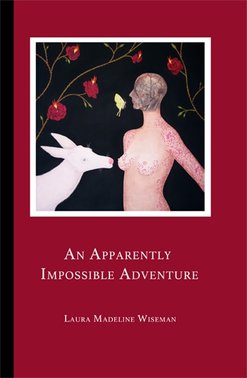
Paperback: 102 pgs
Publisher: BlazeVOX (2016)
Purchase @ Amazon.com
"An Amazing Adventure in Verse"
Review by Cat Dixon
From the first page, the reader is thrust into a world of fairies, but do not be mistaken—this is not all Tinker Bell and pixie dust. In the poem “City Fairies,” Wiseman thoroughly lists fairies we find in our modern day including Happy Meal toys, figurines, and garden statues. Despite these magical creatures that surround the speaker’s family, a medial crisis and the death of the speaker’s husband has put everyone on edge. Wiseman writes, “From the bunk, our niece squawks, Wraiths lack brains. A little like chemo brain, I think, wondering if they hoped fairies had saved her, could save her still, could keep her on some distant isle.”
Part of the adventure at the beginning of this collection is the speaker’s search for fairies in coloring books, posters, any form really—in dollar stores, in jewelry shops and art galleries—as if collecting fairies will somehow bring back the deceased family member, brighten the downtrodden nieces, and move the apathetic husband. As she makes her discoveries, the speaker uncovers her own emotions about her grieving spouse exhibited by these lines in the poem titled “Avalon Movie Marathon Night”:
I shut the door against your reaching hands and tell myself, my flesh, that you can no longer touch me unless I will it. I willed it in college, willed it to you as a young man, as a man in full power of job, income, projects to complete. I’m trying now to will you back to living, not man at battle, warfury, one sister gone.
As the collection continues, Wiseman’s lines implore America, especially in the poem “Candy, Cigarettes, and Fairies,” to return to an earlier time, to a time when we were not all-consumed with materialism:
…that is meant to be us, meant to be America, is everything I remember— fountain drinks, nickel candy from the bottom shelf, bubble gum tattoos, fairy lip balm. America, do you believe in fairies? America, put your queer girl shoulder right here. Snap your fingers. America, don’t die.
The second part of this book explores trees and nature. Many of the most luscious lines can be found here. In the poem “Our Cherry Trees,” she writes, “Because sour cherries pucker the mouth, they were for the songbirds, a living feeder watered by the gutter’s splash.” The sounds of these lines and the strong images are just a taste of Wiseman’s talent. She continues to surprise and advance the reader through the world of trees and fairies. When we reach the poem “The Fairy Tree” dark suspense is unleashed. She writes, “We don’t live among fairies on this adventure, but the fairies live near The Crying Tree, a red leafless creature with swirling bark, growing deep among palms, yuccas, and thorns. In full cry of the blood moon, they give the great cry, the good cry. They are crying out for us.” The fairies intercede for America, for the world, for this grief-stricken family and it appears that no one is listening except for the speaker who shops and hikes and travels in search of them. Yet, there are contradictions. Not all fairies appear to be on the speaker’s side and as in life, she must decipher who is for her and who is against her.
As the third part of this collection unfolds, the true power of the fairies is revealed. The language heightens as the lines race across the page with a hurried urge to share the magic that the fairies have imparted to the speaker. In the poem “Shape Shifter,” Wiseman writes, “As a girl, I climbed into a fountain and became a fat worm, a puddle, a fairy, a red zip-up hoodie damp with wet. I hid in a closet and became a chocolate egg melting in a hand, a clasp of purple eyeshadow, a thief.” The fast-paced metamorphosis conveys the challenge many children have—the pressure to assimilate, to fall in line, to be seen, not heard. This tension continues as the reader, along with the speaker, must navigate through images and emotions rising out of Wiseman’s lines.
In the last poem, “Returning to this American Gothic,” the reader has come full circle on this journey and has found that life does not play out the way we expect, but along the journey we discover new lessons and uncover new magic in the twists and turns. The last line of the poem embodies that: “Here we stand, side by side in Iowa, fecund and green, no pitchfork between us, just our hands.” The speaker and her husband may appear differently than the famous painting, but that is fine for now because she has explored many landscapes—both urban and natural—and had adventures—both good and bad—with fairies.
An Apparently Impossible Adventure is truly an adventure in verse: mystical, specific, and engaging. I am drawn to the imagery, the sounds, and the desire for relief from daily struggles and life-changing obstacles. This collection has much to offer readers as we journey with our own families, communities, and country.
Publisher: BlazeVOX (2016)
Purchase @ Amazon.com
"An Amazing Adventure in Verse"
Review by Cat Dixon
From the first page, the reader is thrust into a world of fairies, but do not be mistaken—this is not all Tinker Bell and pixie dust. In the poem “City Fairies,” Wiseman thoroughly lists fairies we find in our modern day including Happy Meal toys, figurines, and garden statues. Despite these magical creatures that surround the speaker’s family, a medial crisis and the death of the speaker’s husband has put everyone on edge. Wiseman writes, “From the bunk, our niece squawks, Wraiths lack brains. A little like chemo brain, I think, wondering if they hoped fairies had saved her, could save her still, could keep her on some distant isle.”
Part of the adventure at the beginning of this collection is the speaker’s search for fairies in coloring books, posters, any form really—in dollar stores, in jewelry shops and art galleries—as if collecting fairies will somehow bring back the deceased family member, brighten the downtrodden nieces, and move the apathetic husband. As she makes her discoveries, the speaker uncovers her own emotions about her grieving spouse exhibited by these lines in the poem titled “Avalon Movie Marathon Night”:
I shut the door against your reaching hands and tell myself, my flesh, that you can no longer touch me unless I will it. I willed it in college, willed it to you as a young man, as a man in full power of job, income, projects to complete. I’m trying now to will you back to living, not man at battle, warfury, one sister gone.
As the collection continues, Wiseman’s lines implore America, especially in the poem “Candy, Cigarettes, and Fairies,” to return to an earlier time, to a time when we were not all-consumed with materialism:
…that is meant to be us, meant to be America, is everything I remember— fountain drinks, nickel candy from the bottom shelf, bubble gum tattoos, fairy lip balm. America, do you believe in fairies? America, put your queer girl shoulder right here. Snap your fingers. America, don’t die.
The second part of this book explores trees and nature. Many of the most luscious lines can be found here. In the poem “Our Cherry Trees,” she writes, “Because sour cherries pucker the mouth, they were for the songbirds, a living feeder watered by the gutter’s splash.” The sounds of these lines and the strong images are just a taste of Wiseman’s talent. She continues to surprise and advance the reader through the world of trees and fairies. When we reach the poem “The Fairy Tree” dark suspense is unleashed. She writes, “We don’t live among fairies on this adventure, but the fairies live near The Crying Tree, a red leafless creature with swirling bark, growing deep among palms, yuccas, and thorns. In full cry of the blood moon, they give the great cry, the good cry. They are crying out for us.” The fairies intercede for America, for the world, for this grief-stricken family and it appears that no one is listening except for the speaker who shops and hikes and travels in search of them. Yet, there are contradictions. Not all fairies appear to be on the speaker’s side and as in life, she must decipher who is for her and who is against her.
As the third part of this collection unfolds, the true power of the fairies is revealed. The language heightens as the lines race across the page with a hurried urge to share the magic that the fairies have imparted to the speaker. In the poem “Shape Shifter,” Wiseman writes, “As a girl, I climbed into a fountain and became a fat worm, a puddle, a fairy, a red zip-up hoodie damp with wet. I hid in a closet and became a chocolate egg melting in a hand, a clasp of purple eyeshadow, a thief.” The fast-paced metamorphosis conveys the challenge many children have—the pressure to assimilate, to fall in line, to be seen, not heard. This tension continues as the reader, along with the speaker, must navigate through images and emotions rising out of Wiseman’s lines.
In the last poem, “Returning to this American Gothic,” the reader has come full circle on this journey and has found that life does not play out the way we expect, but along the journey we discover new lessons and uncover new magic in the twists and turns. The last line of the poem embodies that: “Here we stand, side by side in Iowa, fecund and green, no pitchfork between us, just our hands.” The speaker and her husband may appear differently than the famous painting, but that is fine for now because she has explored many landscapes—both urban and natural—and had adventures—both good and bad—with fairies.
An Apparently Impossible Adventure is truly an adventure in verse: mystical, specific, and engaging. I am drawn to the imagery, the sounds, and the desire for relief from daily struggles and life-changing obstacles. This collection has much to offer readers as we journey with our own families, communities, and country.

CAT DIXON is the author of Our End Has Brought the Spring (Finishing Line Press, 2015) and Too Heavy to Carry (Stephen F. Austin University Press, 2014). She is the managing editor of The Backwaters Press, a nonprofit press in Omaha. She teaches creative writing at the University of Nebraska. Her poetry and reviews have appeared in numerous journals and anthologies including Sugar House Review, Midwest Quarterly Review, Coe Review, Eclectica, and Mid-American Review. Her website is www.catdix.com.
